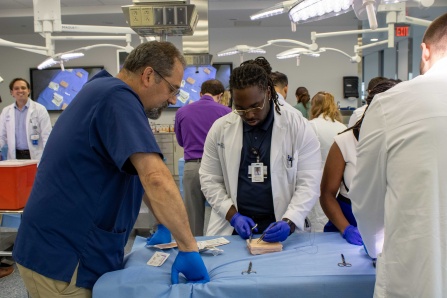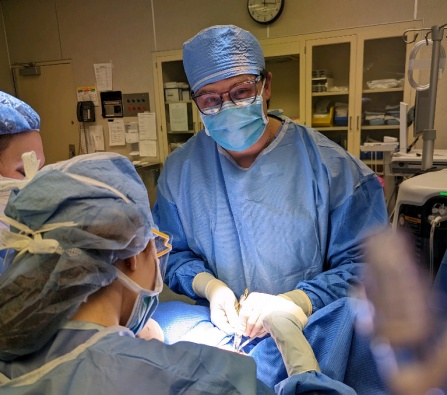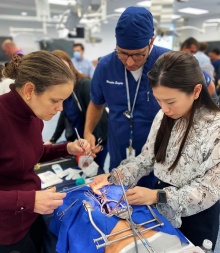Curriculum

Our curriculum will help you fully develop your clinical care abilities, research expertise, professionalism, leadership skills and knowledge about the full spectrum of conditions you will encounter as a specialist in surgery.
First Year
First-year trainees experience incredible growth as they gain exposure to different settings and hospital systems at each of our unique training sites. Each resident functions as a member of the surgical care team.
The PGY-1 residents are responsible for patient care on the floors, although it is also a busy operative year. Responsibilities include evaluation and planning for treatment of patients, attendance at rounds, clinics and conferences and operating experience.
Typical Rotations: general surgery, surgical oncology, soft tissue melanoma, vascular, transplant, pediatric, trauma, trauma ICU, colorectal surgery and bariatric surgery.
Expected Case Numbers by Year End: 100-200 cases
Second Year
After building the foundation in the first year, second years get deeper dive with an integrated curriculum which allows the second-year resident to achieve an increasing amount of clinical independence.
Typical Rotations: general surgery, bariatric/MIS, ICU/critical care, vascular, surgical oncology, breast, head & neck and pediatric surgery.
Expected Case Numbers by Year End: 250-400 cases
Third Year
The PGY-3 year is a critical year and offers incredible growth. PGY-3s are challenged with making the transition to supervisor and team leader.
Further, this year the experience is more broadened. The resident cares for more complicated patients and achieves increasing amounts of clinical independence.
Typical Rotations: general surgery, trauma, surgical oncology (including breast & thoracic), colorectal, bariatric/MIS and breast surgery
Expected Case Numbers by Year End: 375-500 cases

Fourth Year
In the fourth year, residents achieve increasing amounts of clinical independence.
The assignments are designed to provide the clinical experiences needed to become a chief resident.
Typical Rotations: general surgery, trauma, surgical oncology (including breast & thoracic), bariatric/MIS, vascular and transplant surgery
Expected Case Numbers by Year End: 500-700 cases
Fifth Year
The fifth year is designed to provide increasing senior-level experience. Chief residents are expected to fine-tune their decision making judgments as well as their operative technique on major elective procedures.
The chief resident runs the service, prepares and presents at conferences and Grand Rounds and teaches junior residents and medical students.
This final year completes the comprehensive training as required by the American Board of Surgery.
Typical Rotations: general surgery, trauma, surgical oncology (including breast & thoracic), colorectal. Empasis on complex gastroenterologic, endocrine and trauma cases.
Expected Case Numbers by Year End: 950-1200 cases
Conferences and Didactics
Every Thursday there is one hour designated for department-wide Grand Rounds, followed by three additional hours for resident level specific education, simulation, skills training, mock oral examinations, ABSITE preparation conferences, operative case conferences, wellness sessions to support resident mental/physical well being, quality improvement conferences, town halls with the program director and many other great sessions.

Research & Other Professional Development
We prioritize granting our residents flexibility so they may pursue opportunities which best align with their future goals.
Many opt to pursue research, an advanced degree via one of our surgery plus programs, or even a fellowship such as clinical informatics or palliative care. Participation is voluntary and financial support is given as needed. These experiences typically occur after the PGY-2 or PGY-3 year; however, timing can be adjusted to when it will best benefit the resident’s growth.
Those interested in a dedicated research experience are encouraged to spend 1-2 years in a basic science or clinical research program. These positions will be selected on a competitive basis.
Career Preparation
At the time of graduation, most residents pursue a fellowship, but those interested in a career in general surgery are comfortable, confident and competent in their ability to directly enter surgical practice.




